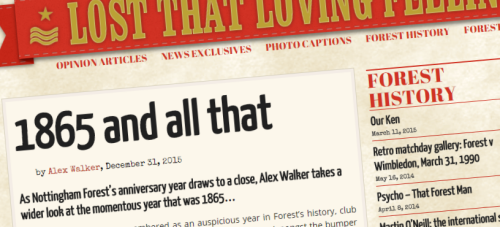Not technically a ‘brief history’ in the context of this website, but it should be of interest to readers regardless, my article about Nottingham Forest’s birth in 1865 was published on LTLF on New Year’s Eve.
2015 marked the club’s 150th anniversary and naturally the year saw a host of new Forest history books being published. However, I felt that many of these titles failed to put the club’s creation into the proper context, so my piece sets out the wider picture of 1860s football and the social hierarchy that fostered it.
The article discusses the likes of Sheffield FC, Notts County, Wanderers FC and Corinthians – and where the ‘Foresters’ fitted into the story of gentlemen amateurs and the emerging working class who would later claim the game as their own.

